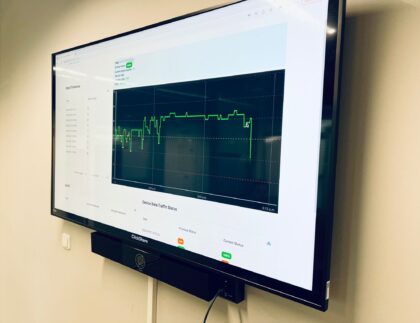
South Sea Island in Fiji, looks nice, but the internet is not.
Image: Getty Images
Remember that TikTok deal involving Oracle and Walmart under President Trump? The one that had Oracle purchasing the social network’s US operations and flinging money into an education fund because Trump demanded a payment to the government?
It’s probably best the deal fell through, but it now appears Australia also wants a crack at showing the world how to keep companies out of Chinese ownership.
If we rewind to 2018, Australia used around AU$200 million of its foreign aid budget to lock Huawei out of building a subsea cable to the Solomon Islands and Papua New Guinea. Instead of Huawei, local telco Vocus eventually picked up a AU$137 million contract to build the cable.
That might work for one-off projects, but for the Pacific arm of bankrupt telco Digicel — that is reportedly swimming in around $7 billion of debt with yearly revenue of $2.3 billion — which China Mobile is said to be circling, another model would be needed.
Enter Australia’s largest telco Telstra, who confirmed last week it was approached by the Australian government regarding a Digicel deal, with the government set to stump up “significant funding” for any transaction.
Rather than the Trumpian demand for an upfront payment, Canberra has spun it around and decided it needs to put its money where its increasingly large mouth is.
While Telstra was mute on the details, the ABC put the deal at around AU$2 billion, including Canberra lending Telstra AU$1.5 billion at reduced rates that would net Australia about AU$30 million annually in interest. Digicel Pacific has networks in Papua New Guinea, Fiji, Nauru, Samoa, Tonga, and Vanuatu.
There is a delicious irony in the government helping the telco it privatised last century to fund the purchase of another operator, but Canberra has few other options. Optus is owned by the Singaporean government, TPG has offshore Vodafone and Hutchison ownership entanglements, the likes of Vocus are too small, and creating something akin to an NBN South Pacific would be a disaster waiting to happen. Meanwhile, as Telstra CEO Andy Penn pointed out recently, Telstra is mostly owned by the pension funds of Australia.
At the same time of Telstra lifting the veil on the Digicel deal, Australia joined a collection of nations to attribute the Exchange hack to China and its Ministry of State Security.
One of the big questions about the action from the United States, NATO, European Union, United Kingdom, Australia, Canada, New Zealand, and Japan was why stop short of the sort of sanctions that have been applied to Russia recently? The quick answer is supply chain entanglement.
The diminishing returns of Huawei show Chinese autarky has not reached a level where it is immune from Western restrictions, but conversely, if China played hardball and clamped down on manufacturing, while that would hurt itself, that would also really hurt the West.
We are currently at the stage where fighters are circling each other, not throwing punches.
In terms of real-world impact, the attribution provided rhetorical strength to Australia’s claim that infrastructure in neighbouring countries needs to be kept out of Chinese telco hands.
“This is a must do thing as we don’t want our neighbouring countries, especially the low developing countries’ critical infrastructure to be controlled by other countries that might have other intentions,” Monash University senior lecturer in criminology at the School of Social Sciences told ZDNet.
“Critical infrastructure protection is now essential to national security. It is important that individual countries can understand that the service provider that they are using has no hidden agenda that is malicious.”
While the Digicel Pacific footprint is now caught up in a geopolitical tug of war, spare a thought for those on the ground who have to live with decisions made in Bermuda, Beijing, and Canberra. In places where only 35% of people have internet access, some simply want better coverage. If Telstra does indeed win out, it should invest in its purchase and maintain its Australian reputation as having the best coverage.
The problem now for governments like Australia, especially if they want to continue to engage in this sort of activity, is they will have to avoid being milked by companies looking to sell infrastructure that could be deemed critical. Because suddenly, the first step in selling subsea cables, a semiconductor fab, or a telco could mean getting a company in China to give you an outrageous price and seeing whether a nation calls your bluff. If that happens, things could turn silly quite easily.
ZDNET’S MONDAY MORNING OPENER
The Monday Morning Opener is our opening salvo for the week in tech. Since we run a global site, this editorial publishes on Monday at 8:00am AEST in Sydney, Australia, which is 6:00pm Eastern Time on Sunday in the US. It is written by a member of ZDNet’s global editorial board, which is comprised of our lead editors across Asia, Australia, Europe, and North America.
PREVIOUSLY ON MONDAY MORNING OPENER:
[ad_2]
Source link
Is your business effected by Cyber Crime?
If a cyber crime or cyber attack happens to you, you need to respond quickly. Cyber crime in its several formats such as online identity theft, financial fraud, stalking, bullying, hacking, e-mail fraud, email spoofing, invoice fraud, email scams, banking scam, CEO fraud. Cyber fraud can lead to major disruption and financial disasters. Digitpol can assist with all stages of cyber related incidents.
Contact Digitpol’s hotlines or respond to us online.
ASIA +85239733884
Europe +31558448040
UK +44 20 8089 9944


